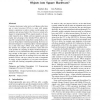Free Online Productivity Tools
i2Speak
i2Symbol
i2OCR
iTex2Img
iWeb2Print
iWeb2Shot
i2Type
iPdf2Split
iPdf2Merge
i2Bopomofo
i2Arabic
i2Style
i2Image
i2PDF
iLatex2Rtf
Sci2ools
153
Voted
OOPSLA
2010
Springer
2010
Springer
From OO to FPGA: fitting round objects into square hardware?
Consumer electronics today such as cell phones often have one or more low-power FPGAs to assist with energyintensive operations in order to reduce overall energy consumption and increase battery life. However, current techniques for programming FPGAs require people to be specially trained to do so. Ideally, software engineers can more readily take advantage of the benefits FPGAs offer by being able to program them using their existing skills, a common one being object-oriented programming. However, traditional techniques for compiling object-oriented languages are at odds with today’s FPGA tools, which support neither pointers nor complex data structures. Open until now is the problem of compiling an object-oriented language to an FPGA in a way that harnesses this potential for huge energy savings. In this paper, we present a new compilation technique that feeds into an existing FPGA tool chain and produces FPGAs with up to almost an order of magnitude in energy savings compared to...
| Added | 29 Jan 2011 |
| Updated | 29 Jan 2011 |
| Type | Journal |
| Year | 2010 |
| Where | OOPSLA |
| Authors | Stephen Kou, Jens Palsberg |
Comments (0)

